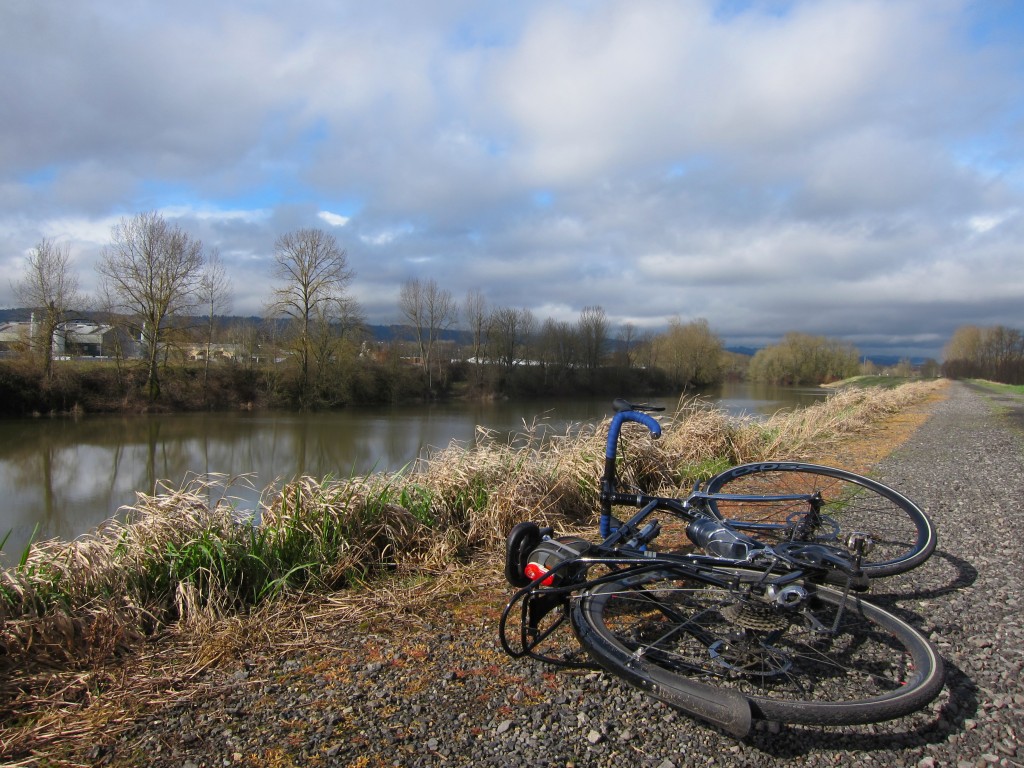When I was in Boise last month, I got to hang out with a dear friend from college — we’ll call her Ariel:) — who I hadn’t seen for way too long. The two of us plus her lovely husband spent a fantastic evening chatting, making dinner, catching up, chatting some more, staying up too late, and then getting up for a joint breakfast before they both had to go to work and I had to bike back to Oregon. It was so super lovely to see them — and then, as if it could get any more awesome, when I got back to Portland I had this:
“I was talking with a co-worker the morning after you headed out and I was telling her how impressed I was with your ride and with the choices that you’ve made around how to lead your life. Springing out of that conversation, she and I decided to set up a little “initiative” within our department to look for ways to minimize our personal impact on a day-to-day basis. We’re going to focus on one topic a month (fuel, water, electricity, food, etc.) and incorporate new habits into our routines that are focused around being more sustainable as humans.”
The topic for this month is fuel, and she and six other coworkers so far are working together on how to reduce their fuel usage. Ariel put together an amazing initial start-up email outlining a whole bunch of ways to use less fuel, and they’re off.
It is the coolest thing I’ve ever heard. Not just that they’re working together and helping keep each other accountable for living more lightly, but also the fact that my friend actually took the time to research a whole bunch about fuel usage and send it out to everyone (that shit takes some work; it’s so easy to just go about your normal habits). ANDÂ it’s so rad that people are into it. I don’t know how it’s going since the initial kick-off, but it makes me happy to imagine at least a handful of people in Boise being mindful of the fact that the way they live takes resources, and trying to minimize that resource use.
So I’m pretty psyched. And though I’m not in Boise, I decided I’d join in as an honorary long-distance member of their challenge. So I, too, am working on how to reduce my use of fuel this month.
Since we don’t have a car and extremely rarely use one, I won’t be changing my own personal car use to save fuel. But, there are still lots of things I do that require fuel. Things like buying food that was trucked to the store for me, or that required petroleum inputs to grow. Things like buying stuff with plastic packaging that required petroleum to create. If it were colder, things like heating our house, since our main furnace runs on oil.
 (organic raspberries from our garden, no fuel required:)
(organic raspberries from our garden, no fuel required:)
I’ve done a bunch of reading, and here’s what I’m committed to doing this month:
- Buy food that was grown organically, preferably from small-scale farms. It not only takes less petrochemical input to produce organic food but also generally uses less fuel to get extensive fertilizer to the farm, plus uses less fuel for plowing that fertilizer, etc etc. (see this or this).
- We already get most of our produce from our super-awesome CSA (thanks, Love Farm Organics!:), but as much as possible, buy any supplemental food from my local farmers market (go Hollywood Farmers Market!:) where it hadn’t traveled too far to get to me AND has come directly from the farm without random side-trips to be packaged, consolidated, etc.
- Avoid plastic like the plague. Almost 3% of total US petroleum consumption is used to make plastic products (about 2% of natural gas usage goes to making plastics as well) (see here). I’m not going to get rid of my plastic things, since the best thing to do is reuse reuse reuse reuse, but I will try not to add any more plastic –or anything I don’t need, for that matter — to my life.
- Research what it would take to convert our oil furnace to biodiesel (or other options?). I’m not sure if that’s the way to go, but I’d like to become more informed about it.
So there you go. Four things I will be doing in my car-free life to still try to reduce the amount I depend on fuel. Feel free to join in, too!
 (of course I will continue to bike everywhere, no fuel except for snacks required:)
(of course I will continue to bike everywhere, no fuel except for snacks required:)
And in case you do have a car, here are some suggestions that my Boise counterparts are working on this month (thanks, Ariel!!:)
- Drive like a granny (or like mom): speeding, rapid acceleration and braking can lower your gas mileage by 33% on the highway and by 5% around town. Of course, please brake when you need to, but try coasting a little more, and cut out those jack-rabbit starts from stoplights. A good rule of thumb for optimal fuel efficient driving is to take about five seconds to accelerate your vehicle up to 15 miles per hour from a stop. Once your car is in motion, try to preserve that motion.
- Coast… a lot: give yourself lots of space and pay attention to what’s ahead and try to coast toward stoplights.
- Go the speed limit: your gas mileage dramatically decreases when you go over 50 MPH (but don’t drive below the limit on the freeway, please). Every 5 mph you drive over 50 mph is like paying an additional $0.23 per gallon per gas (assuming gas at $3.35 per gallon).
- Avoid idling: idling can use ¼  to ½ a gallon of fuel per hour, depending on your car. When you’re parked, turn the car off (this also reduces emissions). Though it may increase starter wear a little, turning your car on and off only takes a few seconds worth of fuel. Worldchanging.com even suggests shutting off your engine at stoplights if you’re going to be there for more than a minute…
- Use cruise control: this helps you maintain a constant speed and helps you save gas (it takes advantage of coasting!). I can vouch that this one really works already. Dips in speed combined with spurts of acceleration can increase your fuel use by up to 20 percent.
- Consider when you use AC: roll down your windows if you’re traveling at in-town speeds; if you’re on the highway, use AC or flow-through ventilation.
- Keep your air filter clean: Conoco-Philips says that a dirty air filter can increase your fuel consumption by 10%.
- Ditch the junk in your truck: don’t haul around more than you need to. The heavier the load, the more fuel you’ll use.
- Keep your tires inflated: tires that are under-inflated negatively impact fuel economy. Under-inflated tires are like trying to roll a beanbag up a hill. The EPA estimates that properly inflating your tires can increase fuel efficiency by 3%!
- Pick your lane and stick with it: Traffic studies have shown that changing lanes doesn’t result in a significantly reduced travel time. Choose your lane (again, think ahead!) and stick with it. This avoids constant surging as you speed into an open lane.
If you do try this, or have any other ideas, let me know! Something that makes me incredibly happy is to imagine a whole army of people consciously working to incorporate habits that are good for the world into their lives — so let me know if you are one of those people, and what you’re doing! :)

Our previous house had oil heat, and we burned b20 (20% biodiesel), which doesn’t require any conversion of the furnace at all. It was about the same price as regular heating oil (that may have changed with rising agricultural costs.) It was actually pretty cool how I found out that biodiesel was an option; I saw a tag on the fuel tank making reference to “undied” fuel. I already knew that diesel was died or undied based on whether or not you had to pay transportation taxes on it, and when I saw that I realized that the stuff you burn in a truck is the same as the stuff you burn in your furnace. I thought of biodiesel engines immediately, and I figured you had to be able to heat with biodiesel. Unfortunately, it’s not a completely clear case that biodiesel actually reduces fossil fuel use when you look at what it takes to produce it.
Yeah, that’s what I have to look into, whether it’s actually worth it when you take biodiesel production and all that into account too. So far, our approach has just been to barely heat our house (heh–which I don’t mind, but has caused consternation with guests;) but I think it’s time to maybe make a more informed decision.
We’re putting solar panels on our roof, so we thought maybe solar-powered electric heating somehow might work out, though I don’t know that replacing a whole system is really the right thing to do either. So I don’t know. More research.